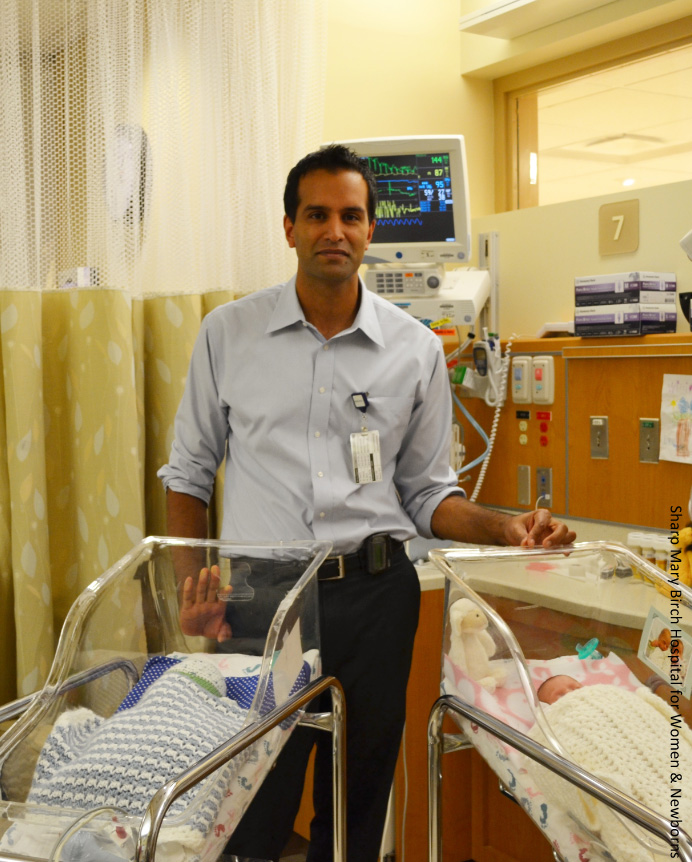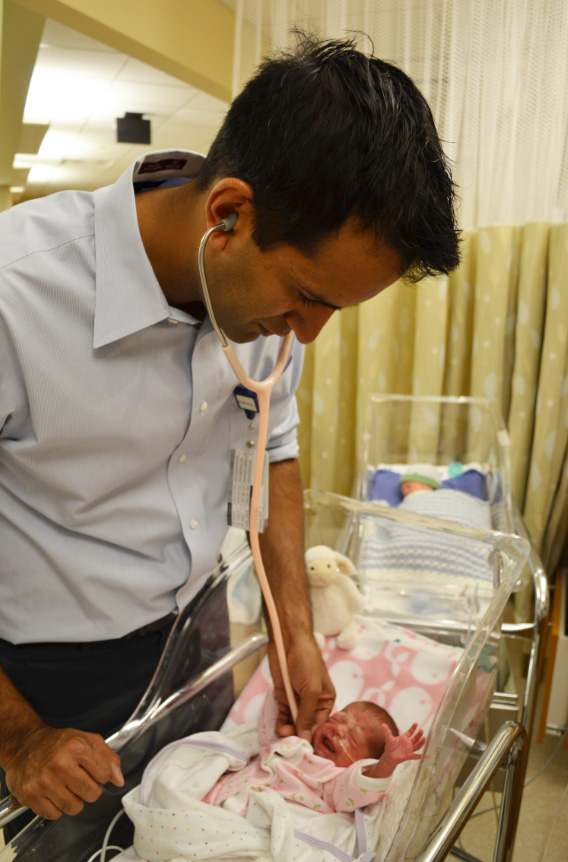
Anup Katheria, MD '04
Anup Katheria, MD '04, can picture that life-changing moment, as a Drexel medical student, when an attending obstetrician let him help deliver a set of twins. "I remember thinking how these babies' lives began right then and there," he says. "That was a real spark — it's when I knew I wanted to spend my career taking care of children from birth and help them achieve their true potential."
As the founding director of the Neonatal Research Institute at Sharp Mary Birch Hospital for Women & Newborns in San Diego, Katheria is doing exactly what he envisioned.
A native of Chicago, Katheria received his undergraduate degree from UCLA before coming to Drexel University College of Medicine. After graduating, he returned to the West Coast for his pediatric training at Children's Hospital of Orange County and a neonatology fellowship at the University of California, San Diego.
In 2013, Katheria joined Sharp Mary Birch Hospital for Women & Newborns in his current role, which allows him to help children both as a researcher and as a physician. He spends roughly half of his week in the intensive care unit, attending to premature infants and babies who have been born with other health challenges. The other half of his time is devoted to developing new ways to improve care for his patients.
"I love taking care of babies on my rounds — that is something I have enjoyed since my days doing a pediatric rotation at St. Christopher's Hospital for Children while I was in medical school," he says. "But I've always had a passion for research and learning more about how we can improve what we do at bedside."
Simple but novel concepts
With no previous research program of any kind in place at Sharp Mary Birch, Katheria has built his organization from the ground up with a mission to develop leading-edge treatments and evidence-based best practices for newborn care. He also brought with him, by means of a National Institutes of Health grant, groundbreaking "LifeStart" resuscitation beds — making Sharp Mary Birch the first hospital in the United States to have them. These beds, conceived by an obstetrician in the U.K., allow newborns who need resuscitation to stay with their mothers, leaving the umbilical cord still connected. A compact structure supports a stable, heated platform for the baby that rests over the mother's body. Studies have shown that babies benefit from delayed or deferred cord clamping, but in cases where babies have difficulty breathing, resuscitation has taken priority. The bed's design permits both at the same time.
Katheria's current work involves studying how allowing babies to stay with their mothers in this way can help achieve better outcomes. "This protocol helps with bonding between mother and baby, and we know that the physiological benefits of delayed cord clamping include allowing more blood from the placenta to the baby's lungs and brain until spontaneous breathing is established. We think the longer we can keep babies attached to their mothers, the less likely it is that they will need the ICU or develop complications like cerebral palsy," he says.
Katheria and his multidisciplinary team have already studied this approach in premature babies to great outcomes. A new proof-of-concept study, completed in September, looked at 60 full-term babies who had a high risk of brain injury. Katheria hopes to expand to a larger multicenter trial across the United States that can follow the children to monitor their longer-term outcomes. "If we can prove that it works, there are great implications for global health care," Katheria says. "This is a practice that can be adopted everywhere, especially with babies born in the developing world with these problems and without access to ICUs. Keeping them with their mothers longer could help save them."

"There are always ways to do things better. In health care, you want to make something that's uncomplicated, inexpensive and easy to replicate."
A member of the Society for Pediatric Research, Katheria has shared his findings, including some studies that involve the use of functional echocardiography and delivery room resuscitation, at national meetings. At the heart of Katheria's research is the drive to improve care through new technologies and simple but novel concepts. "There are always ways to do things better," he says. "In health care, you want to make something that's uncomplicated, inexpensive and easy to replicate."
Katheria conducted an NIH-funded pilot study to compare the effects of giving babies additional stem cell–rich blood through milking the umbilical cord versus through delaying clamping. "We focused on babies born via cesarean section, which is about 80 percent of babies born prematurely. We were able to show that these babies benefited from cord milking, with higher hemoglobin, better heart function and higher blood pressure. We hope to do a larger study and follow the babies for two years."
He's also studying how providing caffeine to premature babies at birth could help improve breathing and cardiovascular function, and reduce the need for a breathing tube. Caffeine has already been proven to help babies with apnea, but it is typically given 12 hours after birth or later. "In our pilot study we looked at what would happen if we didn't wait to see if there was a breathing problem but instead administered the caffeine immediately. The results were very positive. We are now planning a large multicenter study to see what this looks like with 300 or more babies."
Katheria credits Drexel for helping him think holistically about the body and its systems from the earliest days of his medical education. "One of the things I loved most about Drexel was the multidisciplinary approach to teaching medicine. We never looked at any topic in isolation — problems were always examined in an integrated way. It's never just the heart or the lungs, but how all the systems are being affected. That is something I took from the classroom to the clinic and continue in my practice and research to this day."
Forward thinking
Having started at MCP Hahnemann University in 2000, Katheria was there when the school became Drexel University College of Medicine, and he was delighted to be affiliated with a technology-focused university. "It was a very neat thing to have cutting-edge access to tools that weren't available elsewhere. For example, we were using videoconferencing ahead of everyone else."
Katheria believes that that emphasis on forward thinking has prepared him to think outside the box, to streamline and improve long-term care for patients through innovative solutions. At the Neonatal Research Institute, he carries those goals with him every day. "What I'd really like to do as a physician-scientist is change the way birth happens. The majority of babies, of course, are fine, but for the ones that aren't, we can keep improving care. This is where we can give babies the very best start in life, so it's about finding ways of keeping the more vulnerable babies with their parents while they get the oxygen or medicines or blood they need, helping them get life-changing treatments and finding the interventions that make a real difference."